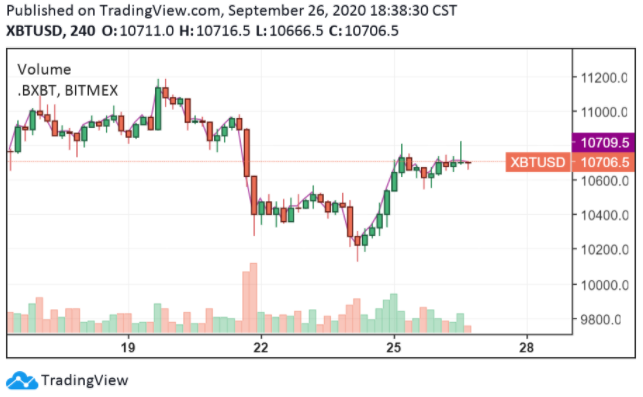
Bitcoin price unfazed after $150M hack of major exchange KuCoin
KuCoin reported a major security breach on Sep. 26, affecting Bitcoin, Ether, and ERC20 hot wallets while BTC and ETH prices remain unfazed.

Image courtesy of CoinTelegraph
In an official statement, KuCoin Global CEO Johnny Lyu confirmed a major hacking attack on Sep. 26. The breach affected the firm’s Bitcoin (BTC), Ether (ETH), and ERC20 hot wallets, after private keys were leaked. Reports estimate the breach to have affected $150 million in user funds.
Following the security breach, the price of Bitcoin barely moved, however. Other major cryptocurrencies, including Ether and decentralized finance (DeFi) tokens also remain relatively unfazed by the hack.
A cryptocurrency exchange security breach historically led to market-wide sell-offs due to the fear of hackers potentially selling the proceeds.
But Tether (USDT) has moved quickly to suspend the transfer of assets that are linked to the security breach. Major exchanges, including Bitfinex, also froze USDT associated with the hack.
The swift response from Tether and top exchanges could prevent most of the funds from being moved by the hackers.

Bitcoin outflows on Kucoin after the hack. Source: CryptoQuant (Click on image for larger view)
KuCoin contacts major exchanges, Tether and Bitfinex freeze $33m
According to Paolo Ardoino, the chief technical officer at Bitfinex and Tether, the two entities froze $33 million in total.
If early estimates are accurate and $150 million were hacked, that represents 22% of the lost funds. He said:
“Bitfinex froze 13m Tether USDt on EOS as part of the hack, Tether just froze 20M Tether USDt sitting on this Ethereum address https://etherscan.io/address/0xeb31973e0febf3e3d7058234a5ebbae1ab4b8c23 as precautionary measure. Stay safe everyone!”
In the official statement, Lyu said KuCoin is now in contact with Huobi, Binance, OKEx, BitMax, and ByBit. The company also said it is cooperating with law enforcement and relevant blockchain projects.
At least in the near term, it would make it challenging for hackers to try to move the funds. The CEO said:
“We are in contact with many major crypto exchanges such as Huobi, Binance, OKEx, BitMax and Bybit, as well as blockchain projects, security agencies, and law enforcement to work on this. Some effective measures have been taken, and we will update with more details soon.”
While a small amount of the hacked funds are in Bitcoin, most are reportedly stored in ERC 20 tokens. The risk of the tokens is that hackers could potentially utilize DeFi protocols in an attempt to eliminate “tainted” tokens.
But according to Primitive Crypto founding partner Dovey Wan, hackers struggled to handle the tainted funds. She explained:
“The hacker who hacked Kucoin apparently is a Defi noob, tried to sell on Binance and didn’t swap the tai/Users/macbook/Desktop/bitcoin-price-unfazed-after-150m-hack.txtnted USDT on Curve. All Defi infra are natural mixers with ultra low slippage… Hackers with normal IQ will soon figure out, this is not some alpha leak and Defi infra is designed to serve all purposes … if a hacker can hack a cex, no point he/she has no idea how to successfully liquidate via dex.”
Bitcoin remains stable above $10,700
After reclaiming the $10,407 whale cluster that has turned into a support area, Bitcoin has seen a short-term trend reversal.

The 4-hour chart of Bitcoin. Source: TradingView.com (Click on image for larger view)
On Sep. 26, Cointelegraph reported that whale clusters at $10,407 grew following the recent BTC rally above $10,700. The data indicates that whales have been accumulating above $10,000, depicting an overall strong market sentiment.
The resilience of Bitcoin despite a high-profile security breach demonstrates the strength of the ongoing uptrend.
Original article posted on the CoinTelegraph.com site, by Joseph Young.
Article re-posted on Markethive by Jeffrey Sloe





